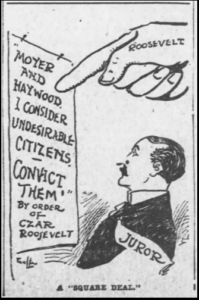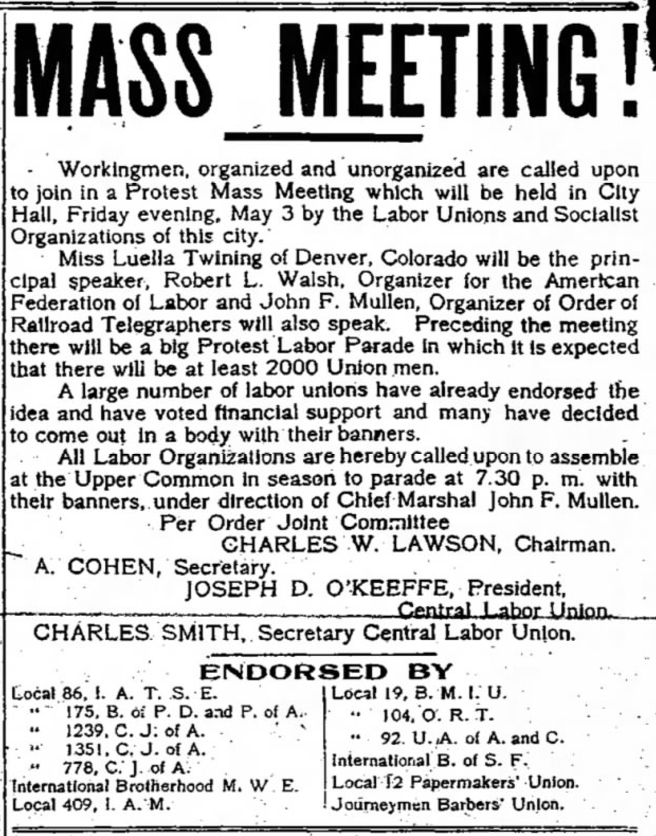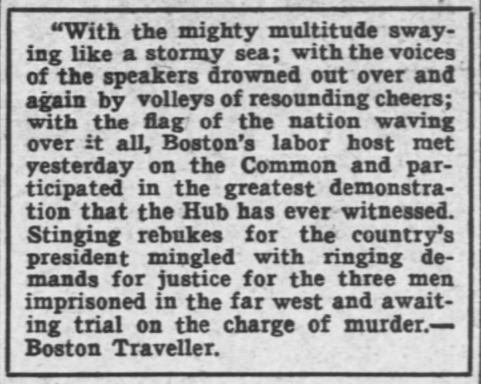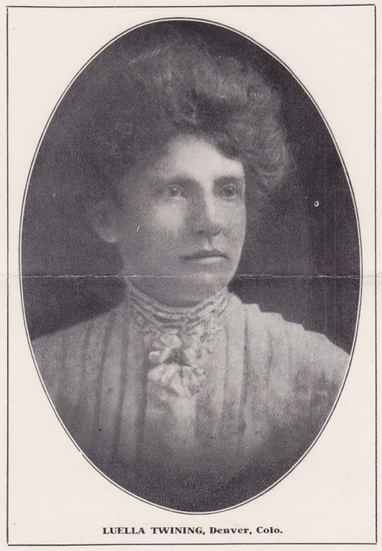If I hang on the scaffold myself
I will do all in my power to defend
Moyer, Haywood and Pettibone.
-Luella Twining
Hellraisers Journal, Wednesday May 22, 1907
Boston, Massachusetts – Monster Moyer-Haywood Demonstration

Massive demonstrations to protest the frame-up of the officials of the Western Federation Miners have been held this month in cities and towns across the nation. Most recently, on Sunday May 19th, the workers of Chicago came out en masse onto the streets, many wearing buttons declaring, “I Am an Undesirable Citizen.” This same button had been worn by the marchers in New York City on May 4th. That parade was one of the largest ever held in the city and concluded with a rally at the Grand Central Palace.
In the May 18th edition of the Appeal to Reason, Luella Twining describes the monster demonstration held in Boston on Sunday May 5th:
ON THE BOSTON COMMON
—–A Hundred Thousand Workingmen
Call The President’s Bluff
-Massachusetts Full of “Undesirable Citizens.”BY LUELLA TWINING.
Special Correspondent Appeal to Reason
WHEN I saw the boys at Fitchburg marching down the street, 2,000 strong, with their banners flying, flags and torches headed by the band playing the Marseillaise, I wept. I could not restrain my tears in Lynn, when I saw the boys there marching 2,500 strong. These were mighty armies parading to show Standard Oil and President Roosevelt that they will not tolerate the railroading of Moyer, Haywood and Pettibone to the gallows. I was elated over the mass meeting in the morning at Lynn, in the ball park, where five thousand citizens assembled to protest against injustice and show their colors. But the demonstration May the 5th, in Boston, was so stupendous I could not comprehend it, and I am sure I never shall be able to.
At 1 o’clock the parade started, headed by the Central Labor union, out to a man, and the biggest band that ever played in Boston. There were fifty bands in line, and they played almost constantly. A cigar-maker called out to one of them “Say, you’ll get tired.” A musician replied: “Do you think we’d play this way for money? Not much. This is to save Moyer, Haywood and Pettibone.” The Socialist Sunday school children were out in high feather. Marshal Spero was afraid to have them march, the parade was so much more enormous than expected, but the little tots took hold of hands, stood fifty abreast, six in a row, and commanded the parade to stop and let them in. One little girl became mixed a little in her excitement and she was hurrahing for “Moywood and Hayer.”
William Kinder, president of the Cigar Makers’ union No. 97, said: “This is the happiest moment of my life. I am happy because I am marching for the cause, and I am marshal of my division in the greatest parade ever held in the United States. I wouldn’t take a hundred dollars for the ribbon I am wearing.”
Thousands of women were in line. They were much applauded and were complimented by the papers. They represented in part the Garment Workers, Cigar Strippers, Women’s Educational Center and others. Blankets were carried and people threw money on them from all sides from the doors and windows, some so high that it seemed to come from the clouds.
Very few saw the whole parade. It was three hours in passing. People asked us how many were in it. We did not know, and nobody knew. The papers sought to minimize it; they said twelve thousand. There were fifteen thousand teamsters alone. A conservative estimate would be fifty thousand.
As soon as the marchers stopped on the Common they were swallowed up by the great crowd. The ground was black with people. There is no estimating the number. The papers said 100,000. A policeman said; “I have been on the Common twenty-seven years. I have never seen a crowd like this.” Mr. Theodore Curtis, who saw that thousands could not hear the speakers, mounted the band-stand in the other end of the park and made a wonderful speech. It was so full of fire and enthused the crowd so that when he finished they took him on their shoulders and marched off with him.
It is a remarkable coincidence that Roosevelt’s letter trying to save himself from the criticism of the working people for calling Moyer, Haywood and Pettibone undesirable citizens, and the report of this wonderful demonstration should have appeared in all the papers on the same day. The Boston papers gave much space to the demonstration, but the New York papers gave Roosevelt’s answer to the New York Central Federated Union a column, and us but a few lines.
The wonderful demonstration Sunday was the fruit of agitation. If some one in every city and town would start a like movement, Standard Oil would never dare to hang our comarades. It is very easy. Visit the unions; state your case. You will be surprised at how they will respond. Organize your conference, set a day for a demonstration, talk it all the time. Don’t say that the working people are asleep and it is impossible to arouse them. That is what they said in Boston. You see it is not true. But let the working people know the truth and you will find a class spirit and sympathy displayed in a manner you will never forget to your dying day. Brothers, this is the time to save Moyer, Haywood and Pettibone. The vultures are waiting for their prey. You alone can save them.
———-
From the Fitchburg Daily Sentinel (Massachusetts) of May 2, 1907:

SOURCE
Appeal to Reason
(Girard, Kansas)
-May 18, 1907
(Also source for image of text within article.)
https://www.newspapers.com/image/67586868/
IMAGES
HMP, Undesirable Citizen, Walker 3, AtR, Apr 20, 1907
https://www.newspapers.com/image/67586854/
Luella Twining
http://korzybskifiles.blogspot.com/2014/09/chapter-22-just-work-work-work-part-3.html
HMP, Demo Luella Twining, Fitchburg Sentinel MA, May 2, 1907
https://www.newspapers.com/image/65222823/
See also:
Big Trouble:
A Murder in a Small Western Town…
-by J. Anthony Lukas
Simon and Schuster, Jul 17, 2012
(The demonstrations in New York and Chicago are well covered.
See, 464-491.)
https://books.google.com/books?id=d07IME-ezzQC


